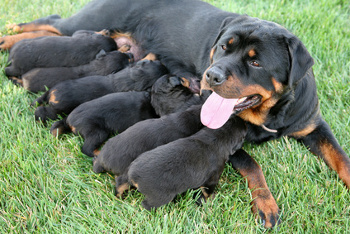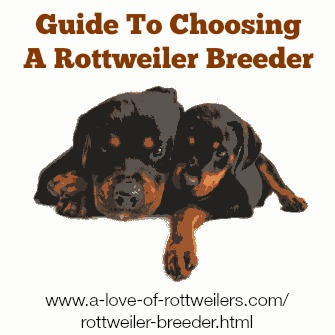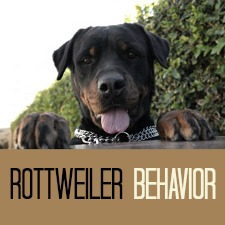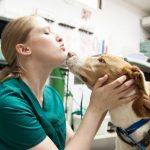In This Article You Will Read About
Taking the time to choose a responsible and reputable Rottweiler breeder is hugely important when you are ready to add a Rottweiler puppy to your family!
That’s because your new puppy is going to be a member of your family for many years to come!
If you want your relationship to be a long, happy and healthy one (rather than a disappointing, frustrating or even tragic one), you have to start out on the right foot.
The information, tips and advice below is designed to help you avoid some of the most obvious pitfalls when choosing a puppy.
It will give you the best possible chance of finding the right Rottweiler breeder, and the happy, healthy, Rottie pup who will be a perfect fit for your home and family.
What Makes A ‘Good’ Rottweiler Breeder?
As with so many other breeds, Rottweilers have ridden a roller coaster in terms of popularity, and not all dog breeders have had the best interests of their dogs (or the breed in general) at heart.
As a result there are many Rotties out there who aren’t good representatives of their breed, either physically or temperamentally.
Certain dog health issues such as hip and joint/eye/heart problems can be genetic (ie ‘run in families’, passed down from one or both parents), as can emotional/temperament problems such as excessive fearfulness or aggression.
Reputable Rottweiler breeders only breed dogs who are 100% fit physically, have passed a selection of health screenings/tests, and are temperamentally sound.
That means that your chances of bringing home a happy, healthy, well-adjusted puppy who will grow up to be a happy, healthy well-adjusted adult, is MUCH greater.
Rottweilers are big, powerful dogs, and if you buy a large or giant-breed puppy, you’ll find that large, or giant, expenses tend to hitch a ride too!
Big dogs eat a lot of food, and they require the ‘L’ or ‘XL’ size of just about everything from toys to medications. All this adds up, even with a healthy pup/adult who requires only routine or preventative veterinary care.
If you find yourself the owner of a pup with serious health issues (more likely if the pup isn’t from healthy parents or wasn’t well taken care of from day one), then your veterinary bills are quite possibly going to be of the giant variety…. and your heartaches may well be too.
I’m afraid that there’s no such thing as a ‘bargain’ puppy!
Buying a puppy from a responsible Rottweiler breeder will likely cost more, maybe considerably more, than buying a pup from a back-yard breeder, or neighbor/friend whose Rottweiler dog just happens to have a litter….
… but in the long run it could save you a LOT of money, and an equivalent amount of heartache.
Research Is Hugely Important!
Puppies are so adorably irresistible, that many a level-headed person (who definitely knows better) has melted at the first set of ‘puppy dog eyes’ they saw….
…. and ended up taking home an unsuitable, poorly bred, or sickly puppy!

A puppy should NEVER be an impulse buy, and long before you ever get your first whiff of ‘puppy breath’, you need to have done plenty of research on your chosen breed and know exactly what you’re looking for – and what you need to avoid.
To make it a little easier, here are some tips, an idea of the things you should be looking for, and some of the questions you need to ask any Rottweiler breeder you’re considering.
1. Study the Breed Standard
Like any other purebred dog, a Rottweiler should look and act a certain way. The ‘blueprint’ for both the physical and temperamental traits of any purebred dog can be found in its’ Breed Standard (a document that describes the ‘ideal’ dog of a particular breed).
Depending on the country you live in, the description may vary a little, but will still describe a dog that could only be a Rottweiler.
To learn more about how a well-bred Rottweiler should look, visit my Rottweiler Breed Standard page. You’ll find excerpts from both the AKC (American Kennel Club) and the ADRK (Allegmeiner Deutscher Rottweiler Klub in Germany) Standards.
Also spend time looking at as many photographs/videos of Rottweilers as you can – this website has tons of photos of beautiful Rottweilers, and on my Rottweiler Videos page you can also see some of these gorgeous dogs ‘in action’!.
If you get the chance, visit some dog shows, and spend time watching the Rottweilers there. Both the United States Rottweiler Club and the American Rottweiler Club usually have a list of upcoming national and regional shows/events.
2. Talk to, and visit, several Rottweiler breeders
When you’re choosing a Rottweiler breeder (or any breeder for that matter), if possible try to visit their premises and meet with them and their dogs face-to-face.

This gives you an opportunity to learn more about them and their dogs, and to see the conditions that the puppies are living in.
Although Rottweilers should never be openly aggressive (without good reason), don’t expect the adults to act like Golden Retrievers!
They should be calm, and accept your presence without fuss, but won’t necessarily be doling out doggie kisses! However, some Rotties ARE very friendly and will greet you with a wagging rear-end, that is also perfectly okay.
If you see signs of aggression or fearfulness in either the adults, or the puppies, it should ring some ‘warning bells’. Neither trait is desirable.
Any responsible Rottweiler breeder will be happy to show you around their kennels/home (although due to infection concerns when the pups are very young, you may find there are limitations).
They should also be able to provide you with proof that their dogs are purebred (pedigree and registration papers), that the litter is registered, and that the appropriate health screenings and checks have been done.
It also should go without saying that the kennels, exercise areas, and the dogs themselves, should be clean and well taken care of.
Don’t be afraid to ask lots of questions (as long as they’re relevant and you’ve done your ‘homework’ in terms of understanding the breed). A good Rottweiler breeder will actually expect this ….. and welcome it.
Also don’t be surprised if you get the impression that the breeder is evaluating YOU too! They want their puppies to go to good, permanent homes with people who understand and care about the breed – so you have to pass their ‘tests’ as well.
3. Make sure the recommended health screenings have been done
Many breeds are susceptible to developing particular health concerns and a responsible Rottweiler breeder will put in a lot of effort to make sure that their breeding stock is free of genetic defects.
For Rottweilers, one of the main concerns is hip dysplasia.
This occurs when the hip socket isn’t properly formed, causing it to become ‘loose’ and allow the joint to ‘slip’ or move around unnaturally, usually resulting in stiffness, limping and pain. In severe cases it can be debilitating.
Although hip problems can be a result of environmental factors such as poor diet, growing too quickly, over-exercising young puppies, or as a result of an injury, most of the time it’s considered to be genetic condition.
If a puppy has parents who have hip dysplasia (even if it’s very mild), or has dogs in its’ lineage who are carriers of the gene for this disease, he/she is at a much higher risk of developing the condition.
To prevent this, reputable Rottweiler breeders have their dogs’ hips evaluated before breeding them.
There are two ways to do this, one is by having X-rays taken of the dogs’ hips and then having them evaluated by the Orthopedic Foundation for Animals (OFA). The hips are then given one of 7 ratings, with ‘Excellent’ being the best you can hope for, and ‘Good’ or ‘Fair’ also being acceptable for breeding purposes.
There’s also a ‘PennHIP’ evaluation which is part of the University of Pennsylvania Hip Improvement Program.
This a newer system and requires more complicated X-rays and manipulations of the joints, and is scored differently.
The rating is recorded as a ‘Distraction Index’ (or DI) value of between 0 and 1, and you want breeding dogs to have a score of 0.3 or below. You can loosely correlate an OFA ‘Excellent’ with a PennHIP Score of 0.1, ‘Good’ with 0.2 and ‘Fair’ with 0.3.
If you buy a Rottweiler puppy from a Rottweiler breeder in Germany/Europe, or buy an imported pup, you may see the hip scores/evaluations in the ADRK-accepted format.
In this case, you will find these equivalents useful… OFA ‘Excellent’ = HD-A, HD-Frei or HD-0; OFA ‘Good’ = HD-B, HD+/-, HD-TC, HD-1; OFA ‘Fair” = HD-C, HC+, HD-2.
Elbow Dysplasia can also be a problem in this breed, so OFA or equivalent evalulation of the elbows is also recommended.
Another issue can be eye problems, including genetic conditions such as Progressive Retinal Atrophy (PRA).
A Rottweiler breeder should have the eyes of all breeding stock examined by a member of the American College of Veterinary Ophthalmologists (A.C.V.O.) to make sure that they are healthy, and free from any inherited diseases.
They can then get a certificate from the Canine Eye Registration Foundation (CERF) as proof of their dogs eye health.
Canine Heart Disease such as Sub-Aortic Stenosis (SAS) is also considered to be a genetic condition, and any dogs who are carrying the gene for SAS shouldn’t be used for breeding.
A Rottweiler breeder should have their dogs hearts evaluated by an approved DVM (veterinarian) and it’s preferred that they be a board certified Cardiologist or have special cardiac training.
If the dog is found to be free of congenital heart abnormalities, then the OFA will provide the breeder with the certifications. You can find a lot of information on Rottweilers and heart disease on my Dog Heart Murmur and Canine Congestive Heart Failure pages.
Rottweilers tend to be predisposed to certain cancers, and are generally not a long-lived breed.
It’s a good idea to talk to breeders about the incidence of cancer, and the average life-expectancy of the dogs in a prospective puppies lineage. And go back 4 or 5 generations if at all possible.
If possible find out whether the above health screening/certifications are also available for the grandparents of any puppy you’re interested in, not just the parents.
It’s not only physical health that is important though, do take some time to pay attention to the temperament and emotional health of a breeders dogs.
As well as the type of behavior mentioned in point 2 above, ask potential Rottweiler breeders if their dogs have competed in conformation shows, obedience trials, tracking and so on.
Or if they have a CGC (Canine Good Citizen) award. You want dogs who are well-rounded and healthy inside and out.
Final Thoughts….
When it comes to choosing a Rottweiler breeder, once you’ve done your homework it comes down to a personal decision.
Here are some of my own personal opinions/beliefs, that I hope will give you just a few other ‘pointers’ to help make sure you choose wisely, and that your story has a happy ending!
…. it’s a good idea to avoid breeders who have more than two different breeds. These may be puppy mills, back-yard breeders, or puppy-brokers – all of whom are often more interested in the money they can make selling puppies, than they are in improving any particular breed.
…. a breeder who often keeps a pup (or more than one pup) from their litters is a good prospect as they are more likely to be following a well-thought out breeding program and have healthy, quality dogs.
…. it’s not good to buy a pup whose momma is younger than two, or older than nine, years of age. Or has had more than one litter in the past 18 months.
…. a Rottweiler breeder who is an active member of a Breed Club such as the United States Rottweiler Club, the American Rottweiler Club, The Rottweiler Club of Canada, the Rottweiler Club of Great Britain (or one of many other recognized national clubs/organizations) should produce excellent puppies.
That’s because they have to follow strict rules and regulations in their breeding practices and are usually devoted to ‘their’ breeds’ welfare.
…. a breeder who has their dogs participate in conformation shows, sports such as agility or tracking, formal obedience work, Shutzhund or other similar activities is often a good choice. It shows that they are proud of their dogs, and that they enjoy working with them.
Please don’t fall into the trap of thinking all of the above is only necessary if you want a ‘show quality’ puppy!
Don’t accept a breeder’s assurances that ‘I’ve never had any problems with hips’ or ‘all my dogs are completely healthy, they don’t need testing’ – or any similar remarks.
If you want to be certain that you’re getting a healthy, well-bred puppy, insist on seeing the proof… and get a health guarantee as well.
Related Pages:





